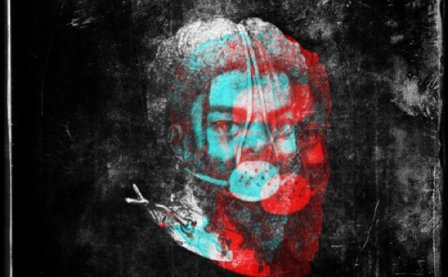Does a muzzled muzzle make a sound? This is something like a Zen koan, but I have follow up questions — though, perhaps Zen does too. Sorry, ideas-of-clarity-as-clarity, or silence-as-sanctity. What does an emanation from said muzzle sound like? What’s being muzzled? Two dots are evenly distributed among the six letters of Gonjasufi’s album title, MU.ZZ.LE, like a divvied colon splayed and on its side, yet counterbalanced and properly distributed in accordance with its own logic. Right-side-up language is upside-down. The partition, or mediation of a muzzle, is implicit to the device: what protects, constricts, but also enables expansion. A muzzle oozes wooze.
On A Sufi and A Killer, Sumach Ecks meditated at length on his ascetic Sufism and violent imagination, his whisper and scream partitioned but inseparably woven on that album as on this one. Polarities attempt grizzled reunification. His Coptic Christian upbringing, Sufist dhikr-like repetitions, and embodiments of Rastafari and Krishna were braided throughout the music on the first album — or, rather, left to dread up nattily. The sound of MU.ZZ.LE is that of even more indefinite interweaving. In a 1990 lecture at Cardoza Law School, Jacques Derrida expounded at length on the inseparability of founding violence and conserving violence: the violence that forms new societies and laws, and another that maintains a priori senses of order and justice. Lawmaking and law-prevention, like non-violence and violence, remain intertwined. Even out of the destruction of a perpetual societal violence inflicted against individuals’ “natural” ends emerge new forms of violence. This is a crux of the apocalypse-minded Gonjasufi’s conundrum. If only creation wasn’t also destruction, then all would be well. A tea party is a holocaust. We don’t even need to go into the modern-day polysemousness of “tea party” to illustrate this point.
I digress. But so does MU.ZZ.LE, even in the context of succinct songs, which only twice overstep three minutes. I’ve rarely felt so uncomfortable with the term “succinct.” It’s my own instance of prevented prevention, or muzzled muzzle-dom — dismissing my own legal sphere, even as I implicitly accept it. For the sake of acceptance: here, Planet Mu meets the Zs of sleep, which meet Le-O the lion: the O of orgasm, obnoxiousness, and an organ more outstretched and Warp’d than Holmes’, Clinton’s, Jagger’s, or Prince’s. I sing “Mu, a Zs, an L and E” to the tune of “doe, a deer, a female deer,” and it doesn’t render Gonjasufi’s project any less threatening or soothing.
On the lurching “Feedin’ Birds,” a duet with his wife, Sumach urges the spreading of love, via sexually emboldened mistletoe, a variation on the popular Christian emblem and a plant like Sumach’s namesake. A sweating cactus plant, additionally metonymic of Ecks’ sex, also populates the track. The mournful spirit of “Strange Fruit” mixes with the melancholic libido of “House of the Rising Sun” and the ugly beauty of Tricky and Martina speaking beyond, but also with, one another. As Jewish humanist Emmanuel Levinas puts it, justice is found in the unknowable Other. At the song’s start, corpses are said to have vanished but, in disappearing, are ever-present, like an evaporating sexual or economic relationship. It’s an impossibly lush desert landscape, at once limited and liberated by religious iconography, conjuring an abstract sense of angelic charitableness as we’re implored to break bread to “feed the birds.”
After this head-clearing and head-filling early track, the breakbeats bang on “Nikels and Dimes” and “Rubberband,” with more harpsichord, layers of dissonant ambience, and the reappearance of breadcrumbs and wine: sensuality, finances, the blood, and the body. Chamber hip-hop slams against the chamber of commerce. Ecks challenges Gil Scott-Heron in the mumbling emotionality department, conjuring transience in the economic and spatial senses — not to mention oft-cited antecedents like Captain Beefheart, George Clinton, and Lee Perry. Though, the weird self-obsessiveness is Ecks’ own, culminating in the song “Blame,” in which he references his own “echo” as he’s “killing in the name of me.” He has the power to make Rage Against the Machine’s idiom his own, without encouraging so much as a guffaw. He testifies his own cruel responsibility in the cleanest vocals to be found on the album, with the music even dropping out briefly to bring vocal persuasions to the fore.
While MU.ZZ.LE isn’t thrilling, in the suspense film sense, it manages to strike a rewarding middle ground between comfort and pain, simplicity and difficulty. If you’ve wanted post-drug states to resemble intoxication or wished for more teakettle whistle simulacra populating your tea parties, this is for you. Why deny the calming agitation of boiling water left to boil?
More about: Gonjasufi




